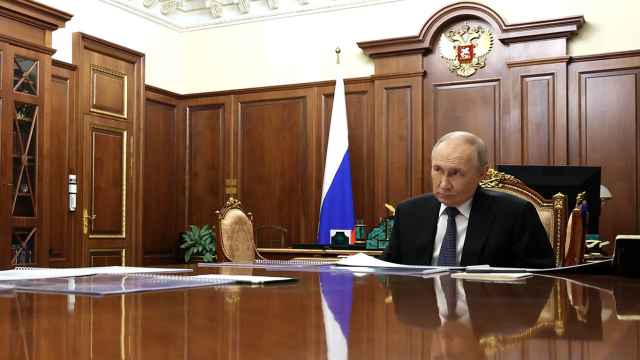Originally published by EurasiaNet.org
One day last summer, Viktor Kazachenko set off across the steppe from his village in northern Kazakhstan, driving to the nearest town on some errands — but he never arrived.
"My brain switched off," he says. "That's it. I don't remember."
Kazachenko had been hit by a mysterious sleeping sickness that is plaguing Kalachi, a remote village 500 kilometers west of the capital Astana. The malady has sent residents into comas lasting days on end.
"I was going to town on August 28," Kazachenko told EurasiaNet.org, still disoriented by the experience. "I came round on Sept. 2. I understood [on waking up] in the hospital that I'd fallen asleep."
Kazachenko blacked out while driving his motorcycle, with his wife riding pillion. "It's good it wasn't that foreign vehicle," he jokes, gesturing at his car standing beside his neat white cottage. "That's fast — a motorbike isn't so fast!"
The motorcycle incident was actually his second extended journey to the land of Nod. "The first time I slept for three days," a chuckling Kazachenko said, flashing a sense of humor about his predicament.
Ultimately, the ailment is no laughing matter. For two years, residents have been falling into comas and suffering debilitating symptoms — from dizziness and nausea to blinding headaches and memory loss.
"After this slumber, my blood pressure started going up for no reason," Kazachenko explained. "Headaches — that's not the word. For six weeks, I didn't know where to put myself. It strongly affects your mentality. I'm very on edge."
Since it first struck in spring 2013, 120 villagers have suffered — around a quarter of Kalachi's population. The latest two cases — which hit on March 1 — brought the tally of incidents to 152. Some, including Kazachenko, have experienced more than one bout.
The ailment is baffling doctors and scientists alike. Despite a procession of nuclear scientists, geologists and ecologists through Kalachi to run tests on soil, air and water, the cause of the sleeping sickness remains a mystery.
Lacking hard scientific facts, many inhabitants are convinced they know the source of the health hazard: a disused Soviet-era uranium mine on the village's doorstep. "We've been thinking it was radiation," says housewife Tatyana Shumilina. "We have a uranium mine here," although it has been "a ruin for years."
Next to the village stands a ghost town: Krasnogorsky, an incongruous urban landscape rising out of the snowy steppe. It was once home to miners dispatched from Russia and elsewhere in the Soviet Union to extract uranium, which powered Soviet nuclear weapons and energy plants. Some of the descendants of those miners now populate Kalachi.
Krasnogorsky was gradually abandoned after the mine closed in the 1990s, following the Soviet Union's collapse. Several dozen families remain living in intact homes interspersed among the ruins, where desolate apartment blocks — with gaping holes instead of windows — are collapsing into the soil.
Experts from Kazakhstan's National Nuclear Center — based in Kurchatov, in the country's east — have conducted tests in and around Kalachi since last April, and they say radiation levels are within the norm. Scientists have detected elevated levels of radon, a radioactive gas, and carbon monoxide, but ruled out this as a cause of the sleeping affliction. Doctors are mystified, with somnolent patients sent to hospitals in Kurchatov and Astana for tests, to no avail.
"On this sleeping sickness, we don't have the results of the studies in our hands yet," Asel Sadvokasova, Kalachi's mayor, acknowledged. As soon as there are conclusive findings, residents will be informed, she said.
Meanwhile, "we're all in fear of falling asleep," as villager Tatyana Pavlenko puts it.
Authorities in Astana are now opting for a radical, and controversial, solution: moving the villagers out of Kalachi to prevent exposure to what is clearly a health hazard, albeit a perplexing one. "Some measures must be taken," the mayor, who has herself suffered a bout of sleeping sickness, told EurasiaNet.org. "This is a good chance for the residents of our village to find a new home and a new job."
Working with local administrations and employers, authorities have already resettled around 100 residents elsewhere in Akmola Region, the 150,000 square kilometer administrative area of northern Kazakhstan in which Kalachi is situated. There are 425 people still living in the village.
It is a "voluntary resettlement," Sadvokasova insists — but some villagers are resistant.
"I'm not going anywhere," asserted sleeping sickness victim Kazachenko belligerently. "Why should I go? I've been here for 40 years. I'm going to die here."
His wife Raisa, who nursed him through two comas, is equally adamant. "I've lived in this house for 20 years. I've lived on this street for 60 years," she told EurasiaNet.org, between hauling water from a standpipe through the icy streets on a sledge. "Now where will they send me? What's awaiting me there?"
"There are families that are not agreeing to move," acknowledged Sadvokasova. "For now we're working with the families that want to resettle. It's all on a voluntary basis."
The authorities are "open to dialogue," she added. In December, officials visited every home to ascertain residents' desires and needs — evidence of an "individual approach."
Some villagers have expressed a preference for some form of compensation for living next door to a health hazard. Despite the dangers, many residents remain opposed to leaving the place where they grew up. "They say it affects the brain; they say it gives people headaches," Raisa Kazachenko said, referring to the sleeping sickness. "But our headache now is where we're being resettled."
A Message from The Moscow Times:
Dear readers,
We are facing unprecedented challenges. Russia's Prosecutor General's Office has designated The Moscow Times as an "undesirable" organization, criminalizing our work and putting our staff at risk of prosecution. This follows our earlier unjust labeling as a "foreign agent."
These actions are direct attempts to silence independent journalism in Russia. The authorities claim our work "discredits the decisions of the Russian leadership." We see things differently: we strive to provide accurate, unbiased reporting on Russia.
We, the journalists of The Moscow Times, refuse to be silenced. But to continue our work, we need your help.
Your support, no matter how small, makes a world of difference. If you can, please support us monthly starting from just $2. It's quick to set up, and every contribution makes a significant impact.
By supporting The Moscow Times, you're defending open, independent journalism in the face of repression. Thank you for standing with us.
Remind me later.





